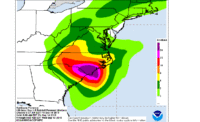Drawn by the potential for hundreds of billions of dollars in construction projects, top executives from 21 U.S. engineering, architecture and energy firms recently traveled to the Middle East on a U.S. Commerce Dept.-arranged, infrastructure-focused trade mission.
Commerce Secretary Penny Pritzker led the March 8-14 trip, which included visits to the United Arab Emirates, Saudi Arabia and Qatar. Interest in the program was high: The 21 firms were selected from 80 that sought to participate.
One executive who made the trip—Kurt Bergman, president and CEO of Michael Baker International LLC, Moon Township, Pa.—says the Middle East region is “flush with money coming out of the oil revenues. ... So it has the ability to dream large.”
Bergman adds, “I would definitely say that they have put themselves into a position where they can afford to buy the best, and that’s what they expect. And so they want American companies to participate.”
Also on the trip was Joseph Burns, a managing principal with Thornton Tomasetti, who says there was a downturn in building in the region over the past half-dozen years or so. But now, he says, “it really feels like it’s coming back.”
Competition, however, will be fierce for the huge amount of construction both among U.S. firms and with companies from other countries.
Bergman and Burns say their firms didn’t sign any contracts during the trade mission. Another participant, Paul Doherty, managing director of the Digit Group Inc., a Memphis-based information company specializing in "smart city" development, said via email, “Since returning from the mission, we have been in close touch with each of our primary prospects and expect closing of contracts within two weeks.”
All three executives say that, thanks to U.S. government officials, the delegation was able to meet face to face with key executives of public- and private-sector owners in charge of building programs in the countries they visited.
Bergman says the contact with top local officials was “fantastic.” He adds that, without the help of U.S. officials, some of the meetings would have taken a company a year to arrange.
The trade mission was only Pritzker’s second such trip since she was sworn in last June as Commerce secretary.
On the trip’s first stop, in Abu Dhabi, U.A.E., Pritzker said U.S. businesses are eager to join with the local government and industry entities on transportation and other infrastructure projects.
She cited the 1,200-kilometer Etihad Railway rail system, the first phase of which is under construction; the Abu Dhabi Dept. of Transportation’s urban rail project; alternative-energy and smart-grid networks; and the Saadiyat Island cultural district.
In addition, Dubai’s World Expo, slated for 2020, is expected to generate $36 billion in infrastructure work and $7 billion in buildings, Pritzker said.
Bergman notes that Dubai also is planning a major new airport because the existing one “is maxed out.” He says the new airfield will be an “airport city,” including housing, shopping malls and a golf course.



